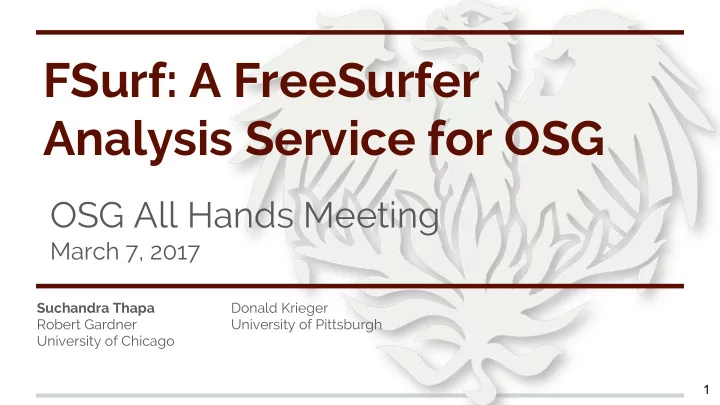

FSurf: A FreeSurfer Analysis Service for OSG OSG All Hands Meeting March 7, 2017 Suchandra Thapa Donald Krieger Robert Gardner University of Pittsburgh University of Chicago 1
FreeSurfer Widely used software suite for analysis of human brain MRI scans. It has been used for studying human brain anatomy in a variety of contexts such as studying the neurophysiology of depression, examining possible anatomical differences involved in ADHD, abd studying autism. Hippocampal region: identified with freesurfer 2
FreeSurfer continued ● Users submit MRI scans and after processing receive annotated and labeled images ● Most users run a standard workflow provided by FreeSurfer ● Some users have more advanced usage: ○ Multiple inputs to a single workflow ○ Different parameters for various workflow stages 3
Standard FreeSurfer workflow ● Can be split into 4 main stages: ○ autorecon1 - MRI image preparation and normalization autorecon2-volonly - further normalization and image preparation ○ autorecon2 - same as prior step as well as generating initial surfaces ○ for brain regions ■ Can be run on left and right hemispheres in parallel Makes effective use of multiple cores (using OpenMP) ■ ○ autorecon3 - final identification and labeling of brain regions ● Running all three stages takes 16-24 hours on a single core, 4-8 hours with 8 cores 4
FreeSurfer stages http://surfer.nmr.mgh.harvard.edu/fswiki/ReconAllBlockDiagram 5
Goals for the FSurf service ● Provide a service that allows FreeSurfer users to take advantage of OSG resources to run FreeSurfer workflows ● Allow users to be able to access the service without having to obtain OSG accounts or requiring knowledge of DHTC concepts ○ Analogous to the Galaxy service for BLAST users ● Allow users quickly start using the service (ideally within an a few hours of signing up) 6
Processing requirements ● I/O requirements: ○ input consists of file with MRI data in compressed format (~10-40MB) output consists of multiple files in a subject directory (~200-300MB ○ tar.bz2 file) ● Memory Dependent on MRI input about ~1.8 to 3GB of RAM ○ ○ May be more for outliers ● Processing ~6-8 hours on a dedicated node with 8 cores ○ portions of the workflow can use multiple cores effectively ○ 7
Basic FSurf workflow ● Runs the 4 stages in a way that takes advantage of parallelism autorecon1 + autorecon2 -volonly ○ ○ In parallel: ■ autorecon2 on left brain hemisphere (using 8 cores) ■ autorecon2 on right brain hemisphere (using 8 cores) autorecon3 ○ ● Only the two parallel steps can effectively use multiple cores Can be run with multiple scans of same ● individual for better error correction 8
More advanced workflows ● Multiple input workflows: ○ FSurf can run the basic workflow using multiple scans of the same individual Allows for errors or motion in scans to be corrected automatically ○ ● FSurf can run arbitrary FreeSurfer workflows Users indicate which options to give to FreeSurfer when running ○ workflow FSurf will then run FreeSurfer with just those options instead of using ○ the basic workflow 9
End user interface ● Simple, easy to use script ○ No installation needed, just download the FSurf script ● Can be used on linux/unix or OS X systems ● Example commands > fsurf submit --input=SubNo_01_defaced.mgz > fsurf status --id 4302 > fsurf output --id 4302 ● User notified by email when submitted workflows are completed 10
FSurf technical architecture Front-end user interface ● ○ Command line script Communicates to the execution ■ service via RESTful-API commands Allows user to submit, view, and ■ remove workflows as well as download results Middleware ○ NGinx / uwsgi server provides ■ RESTful API Backend services (running on a single VM) ● ○ Postgres database Tracks workflow status, locations of ■ inputs and results Stores user information ■ ○ Pegasus submission service (using same infrastructure as OSG Connect) to 11
Monitoring workflow status ● Server handling FSurf job submission and workflow management instrumented with probes to monitor workflow status ● Information sent to a graphite server and available as a Grafana dashboard 12
Monitoring workflow status 2 Running Running autorecon2 jobs autorecon1 jobs Running autorecon3 jobs Idle autorecon2 jobs 13
Testing and Validation ● FSurf has been fairly extensively tested and validated ● Spent several months submitting large numbers of workflows using various options and validating that the outputs match reference outputs ● Discovered several limitations in infrastructure and software and corrected them during testing ● Current service can reliably handle and process large submissions 14
Jenkins for QC Automated testing and validation of FSurf services 15
Release status ● Released initial version of the service with support for standard workflow ● Released second version of service with support for running standard workflow with added features and for running advanced workflows ● Public release imminent ! 16
Conclusions ● FSurf offers an easy to install and simple tool for running FreeSurfer workflows ● Using FSurf allows users to take advantage of the resources provided by OSG without having to become experts in running workflows on distributed systems 17
More information ● Documentation on Fsurf ● Github repo ● Freesurfer project page 18
Acknowledgements ● Don Krieger ● Rob Gardner ● Mats Rynge - help with Pegasus ● Lincoln Bryant - Infrastructure support 19
Recommend
More recommend